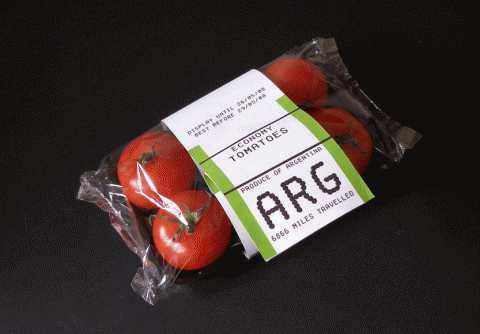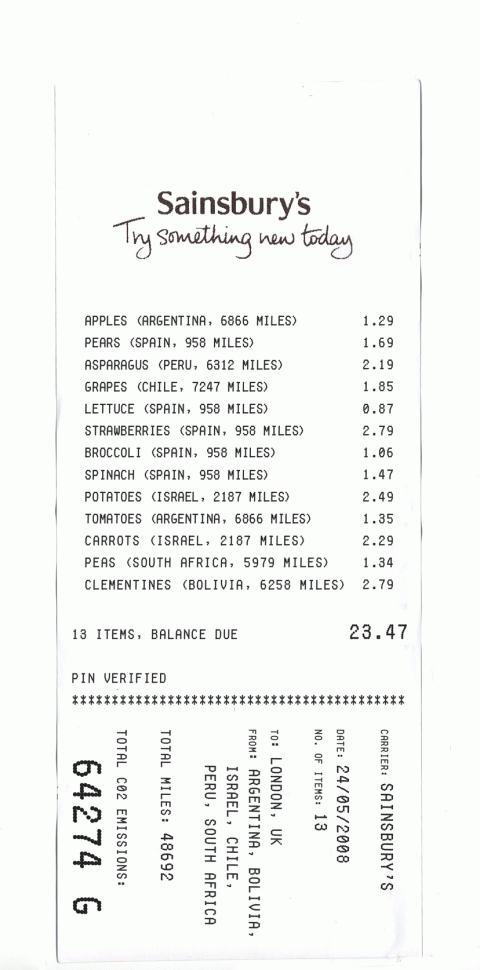

Far Foods is an alternative packaging concept for supermarket produce, highlighting the distances that some foods travel from and the resultant carbon dioxide released during the journey. The receipt features a boarding card style tear-off strip. By James Reynolds.
swissmiss, i subscribed to your blog a couple of months ago and i totally adore it. You have shown me so so so many cool things! Many of which I have re-posted on my blog (www.seedsandstitches.blogspot.com)- with a link back here of course, but just wanted to say thank you!
I love this project- what a cool idea!
Aug 11th, 2009 / 11:07 am
Thought provoking….heavy.
Thank you
Aug 11th, 2009 / 4:51 pm
I think this is interesting. If it happened for real in supermarkets I bet some of us would change our shopping habits… I know I would.
Aug 11th, 2009 / 5:00 pm
I find exiting that people can think of my birthplace as a far away country :P
I’m Argentinian ;)
Aug 11th, 2009 / 11:03 pm
This would defenitely make an impact on what people buy here in Sweden where people are still buying lots of eco-friendly stuff despite recession, especially when it’s two versions of the same product like the tomatoes.
Aug 12th, 2009 / 2:41 am
Interesting idea…will probably make you think twice before buying.
Aug 12th, 2009 / 5:43 am
I have been ‘banging on’ for ages about non-exotic food from exotic places, and been told to ‘get a life’. The silliest for me have been onions from Australia and potatoes from Egypt. Surely this labelling idea is a better approach than the heavy hand of government. Leave the consumer with the choice.
Aug 12th, 2009 / 6:10 am
Ah, the over-simplified Food Miles myth.
http://www.guardian.co.uk/environment/2008/mar/23/food.ethicalliving
Aug 12th, 2009 / 7:13 am
Just because there is local food that is not produced under environmentally friendly circumstances, does not mean we should ignore “the miles”. That’s like choosing to focuse only on burglars and not tax evasion, while in fact both are being criminals.
Aug 12th, 2009 / 7:26 am
Surely you must also give the energy equivalents of trying to grow these at home!
And the incomes sacrificed in the developing country if we cease buying their stuff.
And the debt crises they get into as their mortgages and banks are no longer getting repayments
And the time we give up in the west, and higher earning possibilities foregone, by reverting to small scale subsistence farming.
It is surely better that hot countries which can produce fruit almost for free, do so, and expand our diets and their incomes, so that they can buy the stuff we are good at producing. Or are we all going to go back to the days Reverend Malthus spoke about?
Aug 12th, 2009 / 9:11 am
@William: Exactly what I was about to write. You just can´t isolate this problem. Nigeria exports 20% of their beans to Europe but they got 80% of their income from it. We could of course buy everything from a closer country but it would be catatrophic to Nigera instead.
Aug 12th, 2009 / 11:06 am
Well then Nigeria could actually eat what they produce instead of exporting it to us dirt cheap.
We’ve survived on what we could produce ourselves for thousands of years and we still could.
Aug 12th, 2009 / 11:58 am
But Peter, they would then lose 80% of their income, assuming Jonas is right.
Do you dislike Nigerians or something?
This is where it all falls down. Why shouldnt they export their surplus peanuts and beans and so on, so that they can buy our carrots maybe, or things that they have scarcity in.
Thats what makes international trade so vital, and this airmiles theory so wrong. Everybody gains, in variation of diet and in income maximisation, from trading what they are best at for the produce of others
Aug 12th, 2009 / 12:10 pm
92% of all Nigerians live on less than $2 a day and 72% on less than 1$.
The problem isn’t that they don’t have enough to eat, it’s that they export it to wealthier countries under very bad trading conditions, only to import refined goods on even worse terms.
The idea of international trade as the solution of everything comes from the countries that benefit from it, mainly the western economies.
Aug 12th, 2009 / 12:25 pm
Sadly what is being advocated on this site, withdrawal from World Trade of poor countries, would not tackle inequitable trade relationships. But it would make a lot of enterprising people who do sell us things, suddenly poor, and those who gain only a little from trade, even poorer. I sadly conclude that advocates of Buy Local, are actually racists. If we all only produced locally, we would be living like the taliban very quickly. Look around your houses and see what is made abroad and imagine being without it. Now what is sensible about buying local?.
Aug 13th, 2009 / 12:24 pm
There is another problem with the food miles theory. When, and who decides, what distance is too far?
If I can get tasty cherries from Chile in February, and their growers can buy a mortgage and build a school, but no more local equivalent exists, who is to decide to stop us all and who elected them?
Aug 13th, 2009 / 12:39 pm
If carbon were properly taxed, consumers could not buy “economy tomatos” from Argentina in Britain. That should be everyone’s focus, not some distracting labeling scheme that obscures the real issue.
Aug 24th, 2009 / 10:38 am
Lets all raise taxes on things we disapprove of.
After a while there will be nothing to disapprove of
As nothing will be getting done.
Aug 26th, 2009 / 4:40 am
@william – Ah, the “all or nothing and absolutley nothing inbetween” argument. :-)
Aug 26th, 2009 / 3:38 pm
Yes that was rather blunt and unworthy of this thread. But here in Britain it seems that everything where a minority cannot behave properly, or where some group dislikes something, is precursor to a call to raise taxes on the offending activity. The taxes then start to twist incentives and lead to new types of offensive behaviours, and further calls for taxes. Eventually we reaaly do get bogged down and made to consume inferior goods because competitor products are taxed until they cant compete, and this buy local thing seems to me to be a journey down this road, even if it begins with sincere motives.
Aug 27th, 2009 / 4:37 am